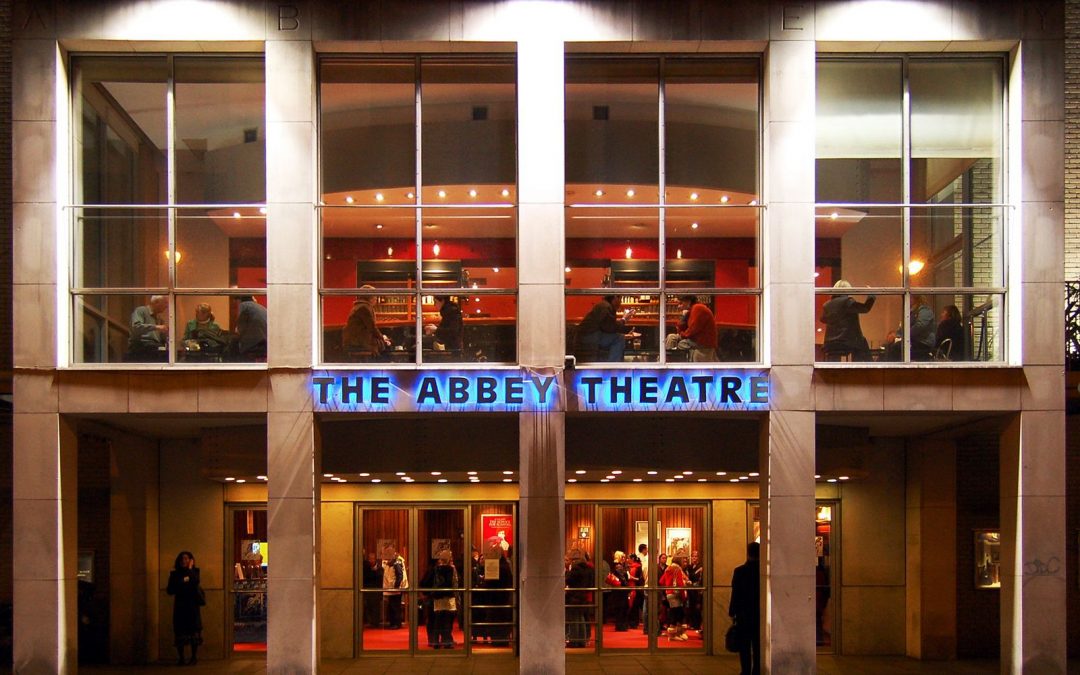Question: Can theatre affect societal change?
Answer: You betcha!
‘…I always write about Dublin because if I can get to the heart of Dublin I can get to the heart of all the cities of the world. In the particular is contained the universal.’
James Joyce
Dublin’s Abbey Theatre program, Waking the Nation, begun in 2015 to commemorate the centenary of the 1916 Easter Rising featured only 1 of 10 plays written by a woman, and 3 of 10 directed by women. This can be viewed as a remarkable paradox in retrospect partly given the now-documented role of women in the 1916 Rising and in the history of the Abbey Theatre founded by W.B. Yeats and Lady Gregory in 1904 which acknowledges the active involvement of women in ‘the revolutionary fervour of the Cultural Revival move from art to action and from the stage onto the street’ in its exhibition, The Abbey Theatre and the Easter Rising, 1916. In addition, the Abbey Theatre Press widely available paperback edition, The Handbook of the Irish Revival: An Anthology of Irish Cultural and Political Writings 1891–1922, edited by Declan Kiberd and P. J. Mathews was published in August 2016 and contains specific sections such as Theatre Matters, Women and Citizenship and Social Conditions, while including women writers, political thinkers, artists and activists in its collection of essays, articles and letters.
In an effort to directly address the noticeable gender disparity following a national reaction to the under-representation of women in the 2016 Abbey Theatre season line-up under the hashtag #WakingTheFeminists, the Abbey Theatre immediately undertook to pay attention to the plays written and directed by, for, with and about a diversity of women in the future. Coined by Irish director Maeve Stone, #WakingTheFeminists was initiated by set designer Lian Bell. The movement involved men and women from not only the theatre and cultural sector but throughout Irish life, echoed in world-wide action and testimonials. Internationally, #MeToo (2017) and #TimesUp (2018) reinforced the momentum already generated by the #WakingTheFeminists movement endorsed at the outset by high profile, Oscar-winning actress Meryl Streep, Emmy-winner Martha Plimton and Debra Messing, star of Will and Grace.
By the end of August 2016, the Abbey Theatre announced eight guiding principles towards ensuring gender equality at Ireland’s national theatre. This year’s 2018 theatre season reaps the rewards of all the concentrated focus behind the scenes, in board composition and administration as well as stage production in making substantive change. The 2018 Abbey Theatre season highlights established names such as Deirdre Kinahan (The Unmanageable Sisters) and Marina Carr (On Raftery’s Hill directed by Caitríona McLaughlin); experimental collaborators such as Gina Moxley (The Patient Gloria with choreographer Liv O’Donoghue and filmmaker John Mcilduff) and Louise Lowe (Thirteen series of site-specific theatre in historically significant spaces); and new first plays from Margaret Perry (Porcelain) and Meadhbh McHugh (Asking for It).
But one example of the potential impact of theatre, The Unmanageable Sisters by Deirdre Kinahan, which takes its title from DeValera’s assessment of women (“the boldest and most unmanageable revolutionaries”) is actually a version of Michel Tremblay’s Les Belles Soeurs, set in Ballymun circa 1973 rather than Montreal in the politically turbulent early 1960s. Speaking of the particular having universal resonance, the play and Tremblay are no strangers to new versions and translations, now estimated in the hundreds in over 25 countries. First produced in 1965, Tremblay’s tragi-comedy play written in joual centering on the strictly delineated lives of 15 working-class women in a Catholic Quebec society speaks volumes to an Irish audience of today as it does the world over. The Yiddish version (Di Shvigerins), directed by the late Dora Wasserman and staged at The Segal Centre in Montreal involved 30 Jewish women taught the Catholic basics on rosaries and Madonnas by Tremblay himself. (Wasserman had two complete casts of 15 doing alternate performances.) A Chicago production by the Steppenwolf Theatre Company, the 1989 Scottish version, The Guid Sisters, premiering at the Tron Theatre in Glasgow and the Italian version staged in Florence are but a few of the many interpretations of a play that has had an impact and influence beyond its specific Quebec language, religion, culture and politics on the plight of women in all strata of society.
Through ongoing vigilance, the Abbey Theatre continues to be a catalyst for change as it has over its long history.



Recent Comments